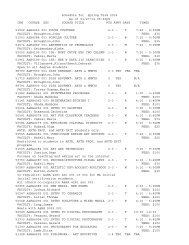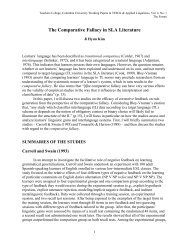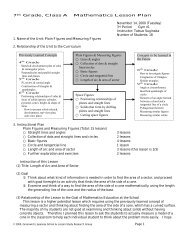UNICEF Mongolia - Teachers College Columbia University
UNICEF Mongolia - Teachers College Columbia University
UNICEF Mongolia - Teachers College Columbia University
You also want an ePaper? Increase the reach of your titles
YUMPU automatically turns print PDFs into web optimized ePapers that Google loves.
CHAPTER 5: TOTAL PAY OF TEACHERS AND THE BONUS SYSTEM<br />
5.2. THE TRIPLE BONUS SYSTEMS<br />
There are currently three types of bonuses given to teachers; some are more clearly defined than<br />
others:<br />
• bonus for winning at Olympiads or compeons<br />
• bonus for outcomes-contract<br />
• skills bonus for quarterly performance (also referred to as A, B, C bonus)<br />
5.2.1. Bonus for Olympiads and Competitions<br />
This parcular type of bonus is a legacy from the socialist past and existed throughout the CEECIS region.<br />
It has become controversial among educators because it encourages teachers to focus on the bestperforming<br />
students, rather than pay aenon and give support to each student in the class. Curiously, the<br />
philosophy of Olympiads/compeon is diametrically opposed to promoon requirements (promoon<br />
to methodologist, lead teacher, and advisor) as well as outcomes-contracts, in which the performance<br />
of the enre class of students—rather than high-performing individual students—is used as a reward<br />
criterion. Nevertheless, these Olympiads and compeons are very popular among teachers for social as<br />
well as financial reasons. They are professional networking events for commied teachers.<br />
1<br />
2<br />
3<br />
4<br />
5<br />
6<br />
The awards for Olympiads and compeons are given twice a year to those students, as well as their<br />
teachers, who scored among the first three ranks. In addion, teachers hold their own Olympiads and<br />
compete against each other. <strong>Teachers</strong> receive a higher award if they themselves win than if their students<br />
win. Olympiads exist at the district, province, and naonal level. The interviews show that teachers were<br />
awarded prizes in the range of 5 percent to 50 percent of their monthly salaries for their performance in<br />
Olympiads or compeons.<br />
From the 123 teachers in this study database, forty-eight (48) teachers or 40 percent of all teachers<br />
were awarded prizes for their performance in Olympiads or compeons. Even though the number of<br />
teachers who win Olympiad or compeon awards is high, the rao of 40 percent is most likely not<br />
representave of the enre teaching workforce in the country. 37<br />
5.2.2. Bonus for Outcomes-Contract<br />
Outcomes-contracts (<strong>Mongolia</strong>n: ür düngiin geree) have been well documented in the research<br />
literature. 38 Aer public protests of teachers in the mid-1990s, the base salary was supplemented with<br />
qualificaon and skills bonuses to augment the salary of teachers. This parcular regulaon from 1995<br />
was one of the predecessors of the bonus for the outcomes-contract that came into effect as of 2003. The<br />
revitalized form, however, has more in common with the public sector management and finance reform<br />
than with the regulaon from the mid-1990s. These contracts are not restricted to teachers but are used<br />
for all public servants, and are an offspring of the results-based management iniave that, with seed<br />
funding from the Asian Development Bank, made it into the public administraon sector a few years<br />
TEACHERS IN MONGOLIA: AN EMPIRICAL STUDY ON RECRUITMENT INTO TEACHING,<br />
PROFESSIONAL DEVELOPMENT, AND RETENTION OF TEACHERS<br />
37 There might very well be a selecon bias in that principals or educaon managers scheduled interviews with the best-performing<br />
teachers that represent the different age groups in the teaching staff. Our only sampling criterion for the selecon of teachers<br />
was maximum variety with regard to age/teaching experience.<br />
38 See Steiner-Khamsi, Gita and Stolpe, Ines (2006). “Outcomes-Based Educaon: Banking on Policy Import.” Chapter 7 of Educaonal<br />
Import. Local Encounters with Global Forces in <strong>Mongolia</strong>. New York: Palgrave Macmillan. Translated in <strong>Mongolia</strong>n as<br />
“Боловсролын бодлогын импорт: Даяар шинэчлэл ба Монголын орон нутгийн хүчин зүйлс” Улаанбаатар: Адмон.<br />
81



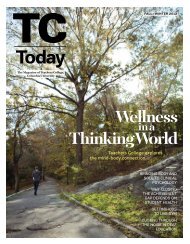
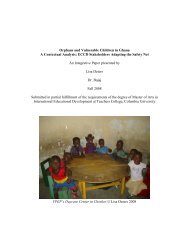
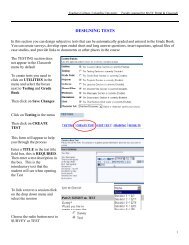
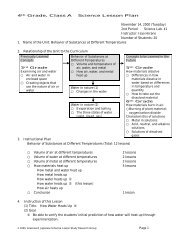

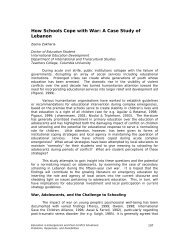
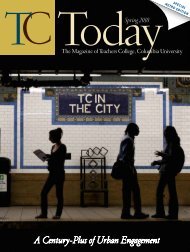
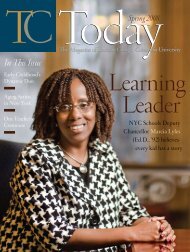


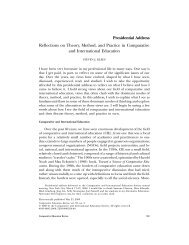
![TC Tod[...].pdf - Teachers College Columbia University](https://img.yumpu.com/27074883/1/190x252/tc-todpdf-teachers-college-columbia-university.jpg?quality=85)
